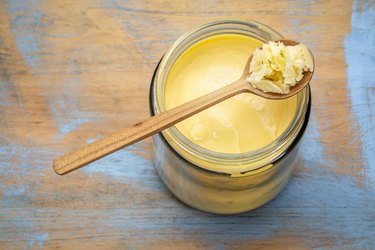
In theory, there are a few "bad" things about ghee, a type of clarified butter that's commonly used in South Asian and Middle Eastern cooking. Like standard butter, ghee is relatively high in fat content. Harvard Health Publishing notes that saturated fats are associated with high cholesterol.
However, ghee provides a delicious, nutty flavor to your cooking. It also has a higher smoke point than standard butter and some other oils, making it a good choice for cooking at high heat. If you enjoy the taste of ghee, just use it in moderation. There's no reason why ghee can't be part of a healthy, balanced diet.
Video of the Day
Video of the Day
Tip
Ghee provides 112 calories per tablespoon, including almost 13 grams of fat. Ghee is likely not healthy in large amounts, but cook with small amounts of the clarified butter to stay within your daily calorie and saturated fat goals.
Read more: Ghee Nutrition Information
Ghee Benefits
One of the main benefits of ghee, aside from the pleasant taste, is that it contains low levels of lactose, so it can often be tolerated by people who are lactose intolerant. However, since it is made from milk solids, ghee is not suitable for people with a milk or dairy allergy.
Read more: Ghee and Milk Protein
Another benefit of ghee is that, like coconut oil, you can use it on your skin and hair. Proponents of ghee for skincare say that it can hydrate and brighten dry skin. Ghee is typically inexpensive, making it a budget-friendly beauty option.
Ghee's high smoke point makes it a great choice for cooking over high heat. It adds a depth of flavor to dishes like coconut curry and can be tasty substitute for butter. Some people recommend baking with ghee, though you should look for a recipe that specifically mentions ghee rather than just swapping it out for butter.
Ghee Disadvantages
One obvious ghee disadvantage is that it can have a higher calorie count than butter, depending on what brand you are using. According to the USDA, one tablespoon of ghee provides 112 calories and almost 13 grams of fat. In comparison, a tablespoon of salted butter provides 102 calories and almost 12 grams of fat (a tablespoon of unsalted butter has the same calorie and fat content).
Read more: Is Ghee Healthier Than Butter?
Another bad thing about ghee is that almost 8 grams of the fats in a tablespoon serving of ghee are saturated fats. The American Heart Association (AHA) recommends limiting saturated fat intake to 5 to 6 percent of your daily calories.
If you are consuming 2,000 calories per day, the AHA says, 120 calories should come from saturated fat — around 13 grams. Thus, one disadvantage of ghee is that a single serving can contribute your daily recommended intake of saturated fat.
Depending on your dietary preferences, another potentially "bad" thing about ghee is that it's made from animal products. If you are trying to cut down on your intake of animal products, use a vegetable oil like sunflower oil or canola oil instead of ghee.